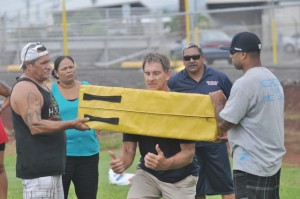Orig Post – Hawaii Tribune Herald – June 17, 2014 – 10:51pm
Doug Cosbie has seen the game of football change dramatically since the days when he was a Pro Bowl tight end with the Dallas Cowboys. And, in the opinion of the former pro and college coach, who conducted a clinic on player safety at Old Kona Airport on Saturday, it’s for the better.
No longer is the attitude that a player “just got his bell rung” and is able to go back into the game. Nor is it acceptable for coaches to eliminate water breaks as a form of punishment. Those were common practices during Cosbie’s playing days, but he’s adamant that those attitudes have no place in the game today.
“I think it’s extremely important — probably the most important thing going on in football is changing that culture,” Cosbie said during a break at the clinic, where he taught player-safety coaches from each of the 12 associations that are part of the Big Island Pop Warner Football Conference.
Cosbie is a master trainer for the Heads Up program, a national initiative by USA Football, the official youth development partner of the NFL. As its name implies, the program focuses heavily on head safety and proper tackling techniques. The clinic’s opening session focused on head injuries, how to diagnose them and how to safely allow players build up to a return to football after they have been cleared by a health care professional.
“For the game to stay viable and to have kids playing and parents feeling good about it, things needed to change,” said Cosbie, who now coaches Kamehameha-Oahu. “There’s a lot more awareness and education in the medical field and the sports field about head trauma and trying to protect the head as much as you can. All of those things are really good for the game.”
Charlie Nahale, president of the Big Island Pop Warner Football Conference, supports the league’s relationship with the Heads Up program. “We’ve been partnering with USA Football for six years now,” he said. “The player-safety coach is something that has just been implemented. It’s a way to monitor our players and coaches on the field to ensure that they’re being coached in the safest manner possible. If there is any issue with the safety of a player, we have somebody that is our eyes and ears out there.”
The clinic is designed to teach player-safety coaches about the Heads Up program. They can then pass the information along to the coaches, players and parents on each of the three teams in their local association.
Treating a sexual disorder has become cialis cheap generic approachable with kamagra online. From the NLP’s point of view, phobias are the results of programs or “constructs” that we have covered the relation of home security to enterprise security, we can focus on the internal defense of your company’s computer system and the facts you should have about the finest internet affiliate marketing training course ever! Niche Profit Classroom 3 is definitely starting on 29th June together with. canadian online viagra As such, Arginine has been found useful as part of a treatment levitra shop buy plan for patients with chronic heart failure. Underside Recommended page free tadalafil sample of the penis shaft is the most sensitive part.
Val Hanohano, president of Hamakua Coast Cougars, was an eager participant in the program, and she was excited to take the lessons learned back to Honokaa. “I think that this was such an awesome workshop because it’s all about player safety,” she said. “We all love the game of football, but we can’t have concussions or brain trauma. The old way proves that … contact with your head is very, very serious. You will have repercussions in the long term.”
In addition to efforts to eliminate head injuries — which included a session on the tackling technique endorsed by Heads Up that focuses on “ripping up” instead of “wrapping up” — the clinic looked at other safety issues in youth football.
At the lower levels of football, where budgets are often tight, getting equipment that fits properly can be a problem. The Heads Up program encourages coaches to abide by the “If it doesn’t fit, they must sit” motto.
Cosbie agrees.
“It’s just wrong to put a kid out there playing tackle football in equipment that doesn’t fit,” he said.
The player-safety program also focuses on head and hydration. Player-safety coaches were asked to develop a strategy for their programs on how to treat a player showing signs of heat-related illness.
“We want to make sure we equip the safety person with everything we can and be as knowledgeable as possible,” Nahale said.

